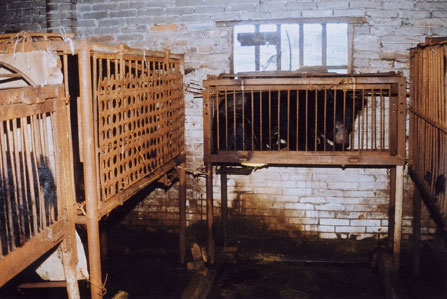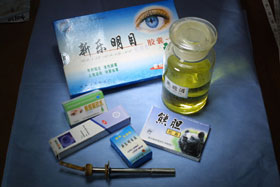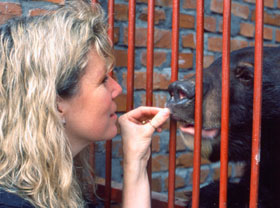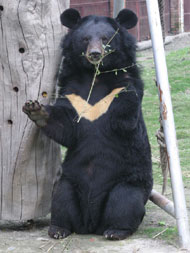Plight of the Moon Bear
Air Date: Week of June 18, 2004
Since the 1980s, the practice of bear farming has devastated populations of Asiatic black bears, more commonly known as moon bears. These bears are hunted for their bile which has been proven to be medically beneficial to humans. Host Steve Curwood talks with Jill Robinson, founder of the China Bear Rescue Project, about the conditions that she’s witnessed on bear farms throughout Asia, and her attempt to reverse the long-held belief that bear farming will save the moon bear.
Transcript
CURWOOD: It’s Living on Earth. I’m Steve Curwood. In the forests and mountains of East Asia, the Asiatic Black Bear is a much admired and sought-after species. Human fascination with these creatures date back centuries, in ancient engravings and sculptures.
If you were to see one today, it would look much like an American black bear, except for a yellow crescent on its chest – a marking that gives it its common name, moon bear. But it’s not so much its unmistakable appearance that makes the moon bear such a coveted animal, but the “liquid gold” it carries inside. Bear bile has been a staple of traditional Chinese medicine for thousands of years. Its health benefits for humans have proven great. But the consequences for the bears are devastating.
Jill Robinson is working to end the practice of bear farming with her China Bear Rescue Project. She’s founder and CEO of Animals Asia Foundation, and joins me now to talk about her investigation of this industry. Jill, hello.
ROBINSON: Hello, it’s a pleasure to be here.
CURWOOD: So, the China Bear Rescue Project has been a labor of love for you for, what, more than five years?
ROBINSON: Oh goodness, since 1993 actually, yeah.
CURWOOD: And you’ve done quite a bit, but for those of us who don’t know your work, who are just catching up to what you’re trying to do, perhaps you could tell us about the first time you first heard of this bear farming in China.
ROBINSON: Right, I’ll never forget it, actually. In fact, I’d heard a little about bear farming almost from when I’d arrived in Hong Kong from about 1985. But I think I never really believed in my mind that something so barbaric could be happening, and it was always something on the back burner while I was working on other issues in Asia, investigating dog and cat markets and wild animal trades, etc. etc.
But one day in 1993, I got a call from a friend of mine that was a journalist, and he’d just come back from southern China where he’d visited a bear farm. And, at that time, there wasn’t the sensitivity about the issue and he informed me that tourist groups were allowed to go there. So I thought, well ok, I’ll join a Japanese and Taiwanese tour group which is what I did. And I snuck over, and whilst the actual tour group were being briefed about the benefits of bear bile by the bile farmer and his wife, I stole away from the group. I found some steps leading down into the basement and I found myself in a very dark room. And really, I could hardly make out too much except that there were many cages there. I wasn’t quite sure what I was looking at but what I did hear were these sort of popping vocalizations. And each time that I…
CURWOOD: Like what? What did it sound like?
ROBINSON: Just popping, pop, pop, pop. And each time I got closer towards the cage, it became louder and more frantic. And as the image produced itself in front of my eyes, I saw these Asiatic black bears in cages so small they could hardly move. And this popping vocalization, it’s a nervous vocalization when a bear is either deeply unhappy or deeply stressed. And it’s usually anticipating something bad that is going to happen to the animal, and that is, as I say, the first sound and first bit of information that I ever got from one of these bears was that my presence was causing an enormous fear.
CURWOOD: The bear was saying, “Help.”
ROBINSON: Well, the bear was really, I think, believing that I was there to take its bile. Because any presence of a human being that ever happened to it in its years on a bear farm, whenever a human was there, something very unpleasant was about to happen.
|
CURWOOD: Now, someone listening to us talking about bear farming might think that we’re talking about breeding bears. This has nothing to do with that. ROBINSON: It’s nothing at all with breeding bears. It’s a horribly barbaric and very cruel practice. China’s actually been farming bears since the early 1980s. In fact, they began it as what they termed as a responsible initiative to save wild bears from being taken for their whole gall bladders, which were then being used in the traditional Chinese medicine industry. And they took bears and placed them in tiny wire cages, again, so small they could hardly move, and began implanting catheters deep inside their gall bladders, from which they could then milk bile on a daily basis. And they figured that that was a humane way of treating a wild species by simply keeping it alive and being able to use its body fluids. CURWOOD: So, I want to go back with you for a moment to this bear farm where you saw the bears in cages. The cages were about the size of the bear, and what else did you see? ROBINSON: Well, it’s what we’re seeing today. I mean, we’ve started the rescue and we’re getting dozens and dozens of bears coming into our rescue center. But I actually won’t forget that first time that I ever saw my first bear on a bear farm. They’d grown into the cage bars, so that meant that they had scars running three to four feet in length across their bodies. They had teeth that had been deliberately cut back by the farmer to the gums, so it was exposing the pulp. They had paws that had been deliberately de-clawed, and I don’t mean just trimming the claws, I mean cutting the end digits off of the fingertips of their paws so that those claws will never grow back again. And this is to take away their defenses and make them easier to milk. They had urine and fecal burns across their bodies where they couldn’t obviously groom properly. They had head wounds from where they’d consistently banged their heads against the bars of the cage because they had literally gone cage crazy. They were completely frustrated, and stereotypic bears, stereotypic animals. And last, and definitely not least, they had gaping infected holes in the middle of their abdomens. I mean, I don’t know how anyone listening to this can comprehend the suffering that a sentient species, an animal that feels pain in the same way that we do, can actually tolerate this existence for up to 20 years of its life, which is what these bears do. You know, you imagine you having a toothache, or you slamming your fingers in a car door, or having chronic stomach conditions. These bears suffer this day in, day out, for 20 years of their life before they die. CURWOOD: So you saw these bears. Then, what did you do next? ROBINSON: Well, just at one point, as I was walking around the farm, I must have stepped back in horror, and I felt something touch my shoulder, and it was a female bear, with her paws stretched through the bars of the cage. And I did something very stupid, in retrospect. I work with bears, I’ve been working with them now for 10 years and I wouldn’t do something so silly today. But her paw was there, and it seemed the most natural thing in the world to touch it and to take her paw. And rather than ripping my arm from my shoulder as she had every right to do, she didn’t. She just rhythmically squeezed my fingers. And if ever any of us get a message in life, that was a pretty significant one for me. We never saved her, and it’s a source of great sadness to me. But she lives on, she lives on in all the other bears we save on the farms, and as I say, she’s become our unknown ambassador. And we gave her the name of Hong, and her memory will live on. CURWOOD: Hong means…? ROBINSON: Hong means bear in Cantonese. CURWOOD: Let’s step back a little bit. I guess the use of bear bile, that is, the liver bile from a bear, goes back into history of Chinese medicine what, thousands of years? ROBINSON: It does, it goes back approximately 3,000 years. And bear bile is termed as a cold medicine used to treat heat-related illnesses such as high fevers and high temperatures, red and sore eyes and chronic liver complaints. I should also say, actually, that there has been such a great belief in Chinese pharmacopeia about the use of bear bile that it actually behooved myself to be finding out more information. And what I did find with very great shock, is that the essential acid in bear bile, UDCA, or ursodeoxycholic acid, it works. Please, let’s not make any mistake about this, bear bile does work. CURWOOD: To fix colds? ROBINSON: Actually, what it is being, could be used to great effect is, it actually rejuvenates brain cells that would otherwise die. So I think people are very excited that this UDCA could be used for Huntington’s, Parkinson’s, and ostensibly for Alzheimer’s disease. But please let me emphasize that this acid, this UDCA, could very easily and very cheaply be synthesized in a lab without using bears. You do not need a bear to be synthesizing this UDCA.
ROBINSON: You’ll find a lot across the board. Basically, for liver complaints, chronic liver complaints, for healing eyes, if you’ve got red or sore eyes. Funny enough, in hemorrhoid preparations. Actually, almost beyond belief, you can find hangover cures, bear bile sodas, teas and wines and tonics. This is obviously a market where it’s beginning to die down in many aspects but there is a sort of overstock of bear bile, if you will, and a lot of the farmers are using it in non-essential medicines. They’re just trying to flog it any way they can, basically. CURWOOD: Talk to me about the economics of this, Jill. You say that people started farming bears, that is, milking their bile instead of killing them. What kind of money do people make if they go into this business? ROBINSON: Well, in the early ‘80s it was a boom industry. Thousands and thousands of dollars could be made from this by the bear farmers every month. It was more money than they’d ever dreamed of. Even today, whole gall bladders can be worth anything up to ten thousand U.S. dollars on the black market. It’s a big industry. But in China itself, it seems to be that there’s a lessening now of demand. It seems that farmers have now passed that boom period. And again, Chinese people are very pragmatic. There are a lot of herbs out there on the market that do the job just as well. So we’ve reached the stage today, twenty years later, where actually bear farming is suffering, and bear farmers are suffering. And that, combined with the cruelty, with the fact that we’ve exposed it very publicly, very internationally, and also that we’re working on the ground with the Chinese government to try to gain solutions to some of the problems the farmers and the local community are facing, all of this adds up to the fact that the government are now willing to close these farms down and to work with Animals Asia in ending bear farming once and for all. CURWOOD: How big has this business been? ROBINSON: Huge, it’s been huge. Massive. CURWOOD: What’s huge? ROBINSON: When I first exposed this industry in the early 1990s, there were some 10,000 bears kept on 500 farms across the country. Today it’s less but it’s still significant, and there’s probably about 7,000 bears kept on about 200 bear farms in the country. CURWOOD: Hmmm, now all this bile from the bears, used in China? ROBINSON: (laughs) Officially, it has to be used only in China but, of course, you go into any other Asian country, or you go into traditional medicine consumers or Asian communities outside of China in the international community, of course you’re going to find illegal bear bile abundantly. CURWOOD: There are a lot of Chinese medicine practitioners in the San Francisco area. If I were to go walking in that neighborhood, would I be able to find some bear bile? ROBINSON: I’m sure in some of them you would be able to. I have to say a lot of other Chinese medicine doctors, practitioners and sellers are becoming, or are very ethical, and are refusing to sell endangered species and products that they shouldn’t being selling. So we’re finding this more and more, that we’re actually getting a lot more support now within the traditional medicine community themselves, which is very, very reassuring to us. CURWOOD: Talk to me about these synthetic substitutes for bear bile. Where do you find them, and how effective are they? ROBINSON: Well, again, they can be packaged. You just find them over the counter now. Synthetic UDCA. There are a variety of different names. There’s one that springs to mind called Actigall. It can be produced for pennies, for nothing. And what I have to say, while having seen those bears on our surgery table whose bile has been used in this industry, I would say that the synthetic version is a lot, lot cleaner. I couldn’t begin to tell you what we are seeing when those bears are laid out, and the mess that we are seeing in their bodies, and what on earth is their bile actually doing to the end consumer. Basically it’s full of pus, what we’re seeing. CURWOOD: I have to wonder if it’s even possible to consider having these bears go back into the wild. It can’t happen, they have to stay in rehabilitation for the rest of their days? ROBINSON: They do, I’m afraid, yeah. But mainly that is because, although we can get them physically and mentally fit again, the problem is that they’ve become too habituated to the human species. They rely on people for food, they always have at the farms. So, if you let them loose, I know the problem you’re getting with American black bears, you know, a fed bear is a dead bear. You’re going to get these bears going into urban areas and, you know, obviously after food. So we have to keep them for life, and this is one expensive program, let me tell you.
|

 Moon bears are often kept in tiny cages on bear farms. (Photo courtesy of Animals Asia Foundation)
Moon bears are often kept in tiny cages on bear farms. (Photo courtesy of Animals Asia Foundation)  A catheter is used to extract bile from a bear’s gall bladder. Marketed bile products include eye medicines, hemorrhoid cream and bear bile wine. (Photo courtesy of Animals Asia Foundation)
A catheter is used to extract bile from a bear’s gall bladder. Marketed bile products include eye medicines, hemorrhoid cream and bear bile wine. (Photo courtesy of Animals Asia Foundation)  Jill Robinson with Andrew, a rescued Moon Bear. (Photo courtesy of Animals Asia Foundation)
Jill Robinson with Andrew, a rescued Moon Bear. (Photo courtesy of Animals Asia Foundation)  A rescued Moon Bear (Photo courtesy of Animals Asia Foundation)
A rescued Moon Bear (Photo courtesy of Animals Asia Foundation) 



